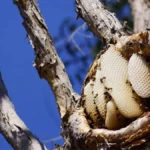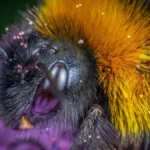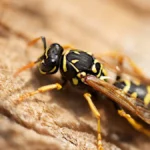Do bees sense fear? I often get asked this, and the short answer is “yes”. There are many things that bees sense, but a scared shivering beekeeper will get stung. If you want to work bees, you have to be confident and calm. Overcoming fear is an important part of becoming a competent beekeeper.
What Is Fear?
Fear is a feeling we feel when we lose control of a situation and the outcomes appear to be most likely to be bad. Typically when humans are in a fearful state they lose the ability to think rationally, and tend to do silly things.
To understand more about how bees see, read here. A quick summary of that article I wrote – bees see the world very differently to us, and most of what they see is movement. In other words, the way they can distinguish between a tree and an animal is by movement – if they buzz a tree, and it does not move, then it is probably a tree. If they buzz something and it starts waving limbs around, it is an animal, so sting it.
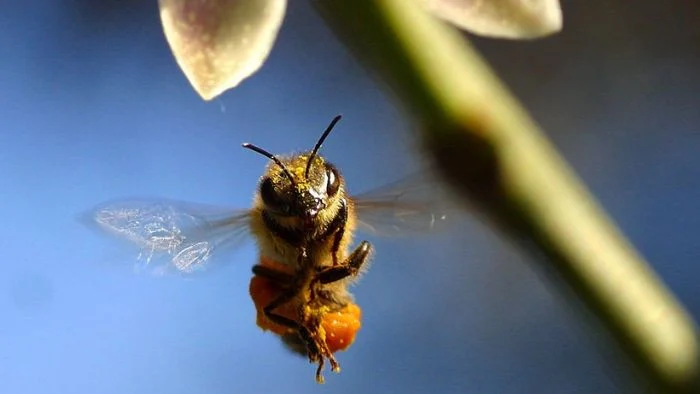
How Do Honey Bees Sense Fear?
When we are in a state of fear, we produce adrenaline. This increases our heart rate, and we start to become warm and produce sweat and more carbon dioxide in our breath. As we do this, we create a trail of carbon dioxide that goes up to our mouths.
Bees can detect carbon dioxide, so they will fly toward the source of carbon dioxide, and this is your face. They will then buzz your face, and try and hit your face, and your reflex response is to then try and swat the bee away – at this point, the bee knows that you are definitely not a tree and will sting your face, or arm.
Read more about Is Harvesting Honey Bad For Bees? &; The Basic Principle Of Beekeeping
Can Bees Smell Fear?
As we have mentioned, bees use their eyes to see the world – and they see it differently from us. They can see movement, but struggle to differentiate between a tree and a human if you are standing still. If you wave your arms around, they know you are not a tree and will sting you.
Bees also have an incredible sense of smell. There are certain smells that are associated with animals – and some of those smells are in sweat. This is why it is rather important not to be a stinky person when you work bees. If you smell of sweat, and rancid skin fat, and greasy hair, bees can sense you are probably not a tree – trees don’t smell that bad. If you sweat out of fear, the sweat smells like animal hormones, and the bees will find you and then buzz you and if you panic and wave your arms around, you will get stung. A lot.
Are Bees Scared Of Humans?
I don’t think bees have fear. They just have responses to things that are a threat. In this regard, they do not like humans. We are one of their biggest predators, and we have been for a very long time. As a result, they have learned how to fight us when we want to rob their hives.
Bees do not like many of our smells, the smell of ear wax, the smell of human sweat, the smell of human hair fats. This is why bees kill horses – horses have many of the same fats and waxes in their hair as us. The result is that bees think horses are humans and sting them to death. Horses pose no threat to bees at all in reality.
What Are Bees Scared Of?
I personally do not think bees are scared of anything living! They are the most fearless animals I know. They are however scared of fire! This is why they are calmed by smoke. Smoke makes them think that their hive is about to be burned in a fire and the result is that they load their stomachs with honey.
Once a bee has a stomach full of honey, it is less likely to sting, because then the honey will be wasted, so it now fears death and becomes less of a fighter. This is much like humans – if we look at the US war in Vietnam, American soldiers were richer than the Vietnamese soldiers. The Vietnamese soldiers had nothing to lose, other than their country, and the American soldiers had a lot to lose because their life back home was great. Hence the soldiers with no wealth are braver than those that have something nice to lose. Bees with a full honey stomach make worse fighters than ones with empty stomachs. There is a lesson in there.

Do Wasps Smell Fear?
There are many different types of wasps, and some are more unpleasant than others. I know that some wasps get irritated by types of hair sprays, deodorant, and definitely fear. Wasps do not die when they sting, so they can be a bit more horrible in terms of testing to see if something is a tree or a person. In this regard they will tend to sting a lot more easily, just to test out the theory that you may be a threat.
So Do Bees Sense Fear?
Do bees sense fear? Yes. Do they know how to make you feel fear? Yes. They are good at scaring people and other animals to make them move and act fearfully.
As a beekeeper, you have to overcome your instincts and not display fear, and in this way, you will be invisible to the bees. Do bees sense fear in a beekeeper? Just remember, if you act like a tree, the bees cannot see you – calm graceful movements like a branch gently moving in the wind. As soon as you make sharp jerky movements with your arms you know that you are telling the bees you are a human and they will get you!
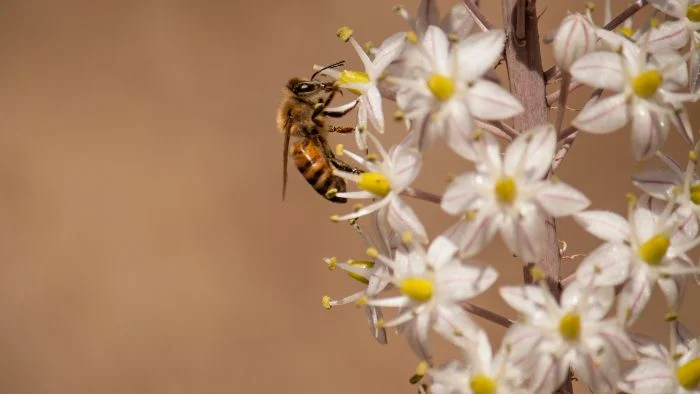
Bees Sense Your Fear FAQs
Do bees really sense fear?
Yes, bees can sense fear through several indicators like movement, smell, and body heat. Fear responses like quick movements or sweating can trigger their defensive instincts.
How do bees detect fear?
Bees detect fear through heightened human activity, like rapid breathing and increased carbon dioxide in the air, as well as sweating and jerky movements that signal danger.
Can bees smell fear?
While bees can’t directly “smell” fear, they can detect sweat, which contains hormones released during stressful situations. These smells signal that something is not right, making them more defensive.
Why do bees attack when someone is scared?
When a person is scared, they often move erratically, releasing sweat and more carbon dioxide. These changes make bees view them as a threat, prompting them to attack.
Are bees more aggressive towards humans?
Bees don’t inherently dislike humans, but they react aggressively if they perceive threats, such as rapid movements or certain odors that resemble predators.
What role does carbon dioxide play in bee attacks?
Bees are highly sensitive to carbon dioxide, which increases when a person is scared. They tend to target the face because this is where CO2 levels are highest.
Can staying calm really prevent bee stings?
Yes, staying calm and moving slowly can prevent bees from perceiving you as a threat. Erratic behavior is more likely to trigger an attack, while slow, deliberate movements can keep you safer.
Why are bees calmed by smoke?
Smoke tricks bees into thinking there’s a fire, prompting them to prepare for hive evacuation. In this state, they are more focused on survival than stinging, making them calmer.
Do other insects, like wasps, also sense fear?
Wasps can also detect fear responses like sweat and rapid movements. Unlike bees, wasps can sting multiple times without dying, making them more aggressive when agitated.
How can beekeepers avoid triggering fear in bees?
Beekeepers are trained to stay calm and avoid quick movements. Wearing protective gear and handling bees gently reduces the risk of alarming them and prevents attacks.

Dr. Garth A. Cambray is a Canadian/South African entrepreneur and beekeeper with 28 years of experience in apiculture and specializes in adding value to honey. His Ph.D. research developed a new advanced continuous fermentation method for making mead that has resulted in a number of companies globally being able to access markets for mead. His company, Makana Meadery, exports honey mead to the USA where it is available to discerning connoisseurs. He has also developed technologies to commercially manufacture organic honey vinegar in Zambia for export globally. He holds a few patents globally in the ethanol industry and believes in technology and knowledge transfer for human development and environmental sustainability. One of his proudest achievements is the fact that the wind farm he started at one of his old apiary sites has essentially made his hometown carbon neutral.


